Views: 0 Author: Site Editor Publish Time: 2025-08-26 Origin: Site








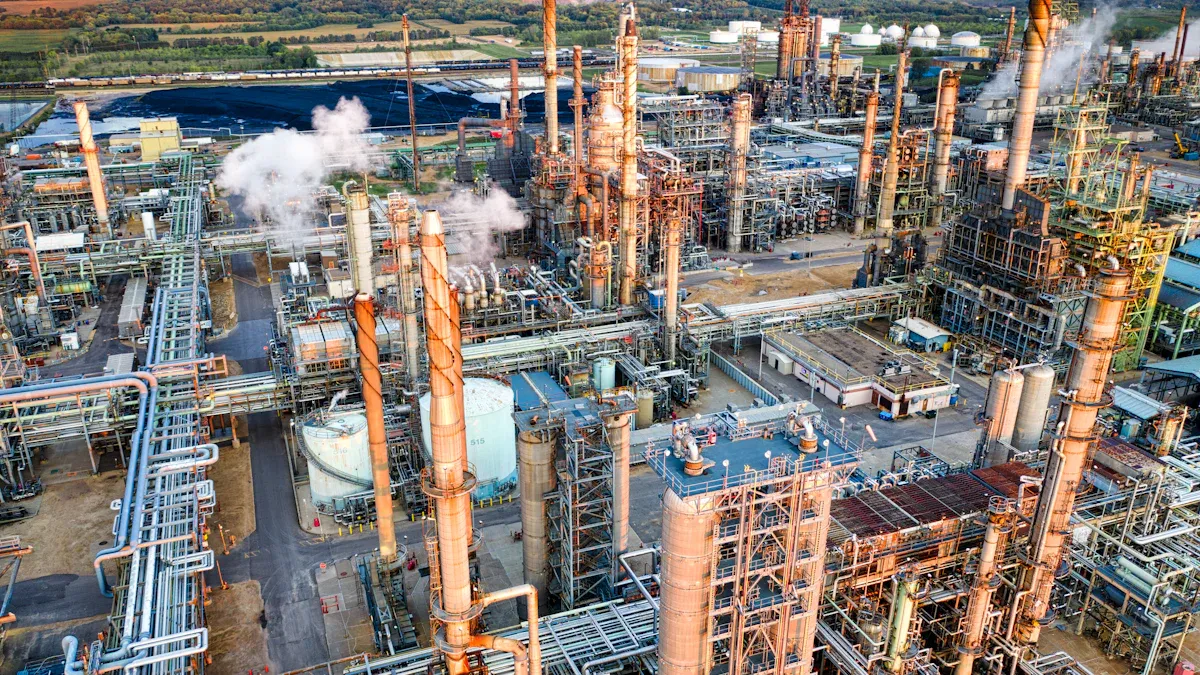
Chemical industries make things people use daily. These industries help make plastics, medicines, and fertilizers. They also make many other products. The global chemical market was about USD 145 million in 2024. It may grow to USD 214.4 million by 2032. People depend on chemical industries for jobs and new technology. Companies now look for eco-friendly solutions. They want smart ways to make products last longer. Innovation and sustainability are very important. These ideas help chemical industries shape the future.
Chemical industries make many things we use every day, like plastics, medicines, and fertilizers. These things help with health, farming, and technology. Chemical industries are important for the world’s economy. They give people jobs and add a lot of money to the world. Companies try to be better for the planet. They make less waste, use safer materials, and create products that last longer. Research and new ideas help chemical industries make better products. These products can be stronger, safer, and better for the earth, like anti-hydrolysis agents and biodegradable plastics. Safety is very important. There are strict rules and training to keep workers, communities, and the environment safe.
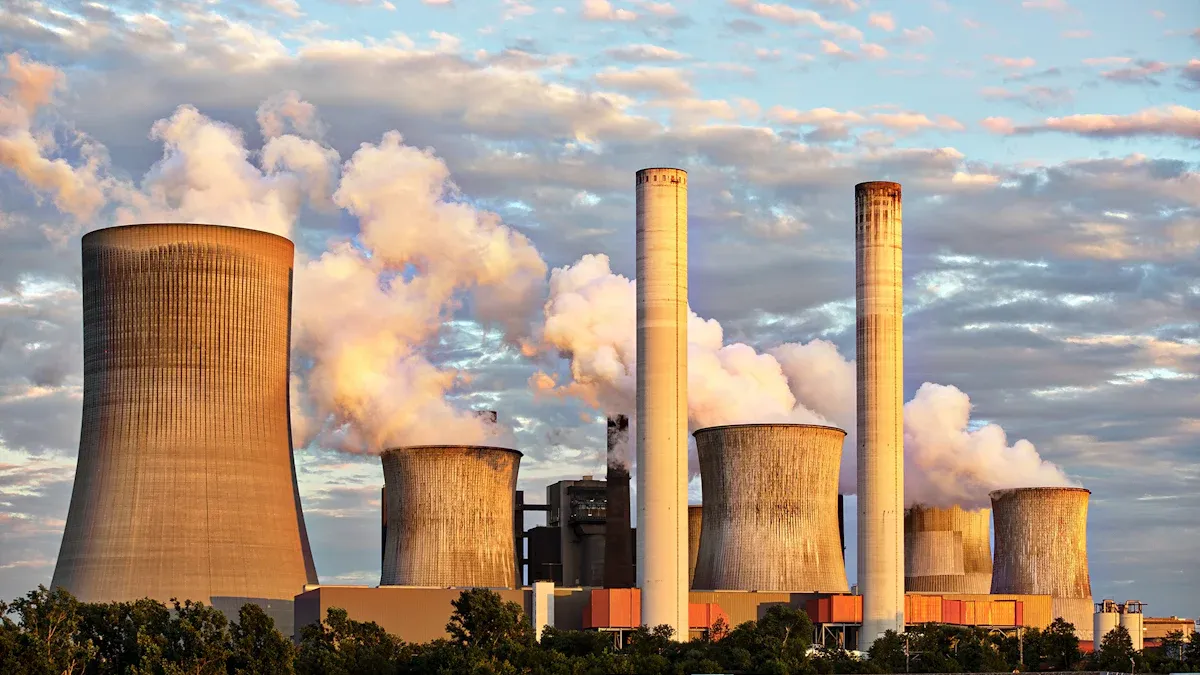
Chemical industries are very important for the world’s money system. They give jobs to many people and help other businesses grow. The industry adds about $5.7 trillion to the world’s total money, which is almost 7% of all money made. Chemical industries hire 15 million people directly and help 120 million people have jobs around the world. The supply chain brings in another $2.6 trillion and helps 60 million more people work. In the United States, chemical industries sold $457 billion worth of products in 2020 and added $225 billion in value. Asia-Pacific is the top region, making 45% of the industry’s money and giving 69% of the jobs.
Aspect | Value | Description |
|---|---|---|
Global GDP Contribution | $5.7 trillion (~7% of global GDP) | Total contribution including direct, indirect, and induced effects |
Jobs Supported Globally | 120 million | Total jobs supported across all impacts |
Direct GDP Contribution | $1.1 trillion | GDP added directly by the chemical industry |
Direct Employment | 15 million | People employed directly in the chemical industry |
Supply Chain GDP Contribution | $2.6 trillion | GDP generated through supply chain spending |
Supply Chain Jobs Supported | 60 million | Jobs supported through supply chain activities |
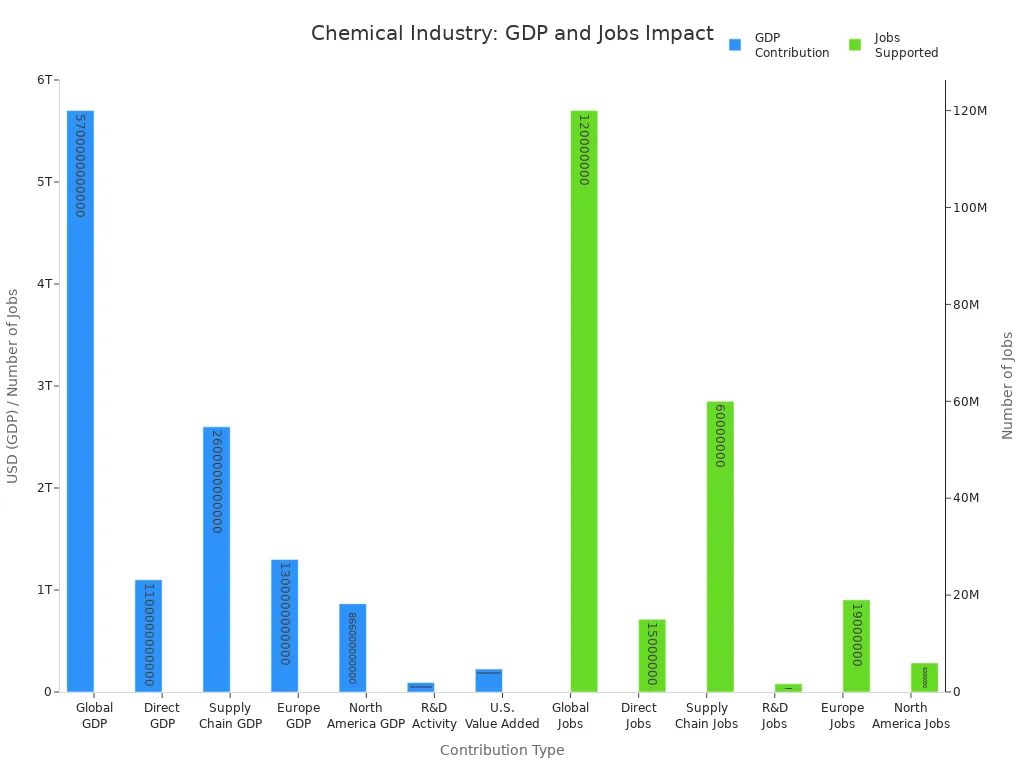
People use things from chemical industries every day. Water, salt, and baking soda are made by these industries. These things help with cooking and cleaning at home. They are also used to make medicines. Detergents help wash clothes, and preservatives keep food safe to eat. Chemical industries make materials for clothes, plastics, and paper. Medicines like aspirin and pain relievers are made with chemicals. These products help people stay healthy and live better lives.
Category | Common Chemicals / Products | Daily Life Uses / Functions |
|---|---|---|
Fundamental Chemicals | Water, Salt, Sodium Bicarbonate, Ethanol, Carbon Dioxide | Cooking, cleaning, bathing, food preservation, energy production, transportation |
Cleaning Products | Detergents, Sodium Sulphite | Laundry, antibacterial cleaners, dishwashers protection, dirt removal |
Medicines | Aspirin, Sodium Bisulphate | Pain relief, anti-inflammatory drugs, gastrointestinal antiseptic |
Beauty Products | Talc, Formaldehyde | Cosmetics, moisturizers, hair products |
Many chemical industries now care about protecting the planet. They make plans to cut down on waste and use safer ways to make things. Companies spend money on new ideas to find better ways to work. They use things that can be replaced and recycle chemicals to help nature. Green chemistry helps lower the use of bad substances. Digital tools help watch and improve how things are made. Suzhou Ke Sheng Tong New Materials Technology Co., Ltd. is a leader in this. The company makes anti-hydrolysis agents that help polymers last longer and support eco-friendly materials. Their work helps companies use less and make less trash.
Companies like Suzhou Ke Sheng Tong show that new ideas and caring for the planet can go together. Their products help make things stronger and last longer, which helps make the future cleaner and better.
Chemical industries make many products that people use every day. These products fit into different groups. Each group helps with different needs at home and in businesses.
Industrial chemicals are very important for making many things. Companies make a lot of these chemicals for other businesses to use. Some common ones are sulfuric acid, ammonia, sodium hydroxide, and ethanol. These chemicals help make fertilizers and clean water. They also help create energy. The oil and gas industry uses chemicals like demulsifiers and corrosion inhibitors. These help machines work well and stay safe. The pulp and paper industry uses sulfite liquors and cooking liquors. These turn wood into paper.
Chemical Name | Industry Group | Approximate Production Volume (billion lb/yr) |
|---|---|---|
Sulfite liquors and cooking liquors | Pulp and Paper Industry | ≥ 200 |
Petroleum residues (vacuum) | Petroleum Products | ≥ 200 |
Ethanol | Organic Chemicals | 100 – <110 |
Sulfuric acid | Acids | 70 – <80 |
Ammonia | Agricultural Chemicals | 40 – <50 |
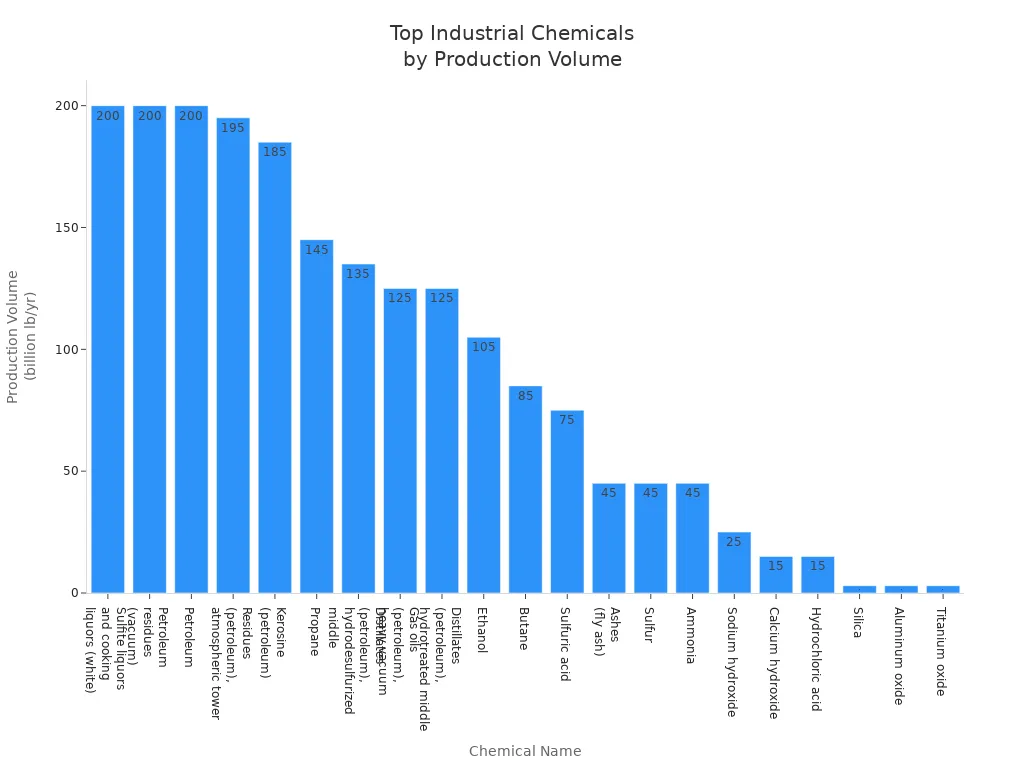
More of these chemicals are made as new businesses grow and new ideas come out.
Specialty chemicals are made for special jobs. They often need new technology to make. These include adhesives, catalysts, coatings, and plastic additives. They are used in building, electronics, cars, and health care. Specialty chemicals are special because they have unique features and are worth a lot.
Suzhou Ke Sheng Tong New Materials Technology Co., Ltd. is a good example of new ideas here. Their Anti-hydrolysis Agent keeps polymers from breaking when they get wet. This helps things like solar films, biodegradable plastics, and 3D printing materials last longer. The company also makes polyurethane chain extenders. These make plastics stronger and more bendy for sports gear and machine parts.
Suzhou Ke Sheng Tong’s Anti-hydrolysis Agent helps companies that need strong and long-lasting materials, especially where water can cause problems.
Specialty chemicals are becoming more important. The market for them may be over USD 900 billion by 2030. This is because more cars, electronics, and buildings need them.
Aspect | Details |
|---|---|
Market Size 2023 | USD 285.4 billion |
Projected Market Size 2030 | USD 914.4 billion |
Key Growth Drivers | Automotive, electronics, construction, pharmaceuticals, personal care |
Sustainability Trend | Shift towards green and sustainable specialty chemicals |
Chemical industries make goods people use every day. These include cleaning products, detergents, cosmetics, and medicines. Chemical companies make preservatives to keep food fresh. They also make fragrances for personal care and ingredients for safe medicines.
Soaps and detergents help keep homes and offices clean.
Cosmetics and personal care items use chemicals for color, smell, and feel.
Medicines use chemical compounds to help people get better and stay healthy.
These products help people, but some chemicals can be unsafe if not handled right. Safety groups make rules to protect people and nature.
Advanced polymer solutions are growing fast in chemical industries. Polymers are big molecules used to make plastics, fibers, and films. New ideas include plastics that break down, strong composites, and materials for 3D printing.
Suzhou Ke Sheng Tong’s Anti-hydrolysis Agent is important here. It helps PET-based films for solar panels last longer. It also makes biodegradable plastics like PLA and PBAT stronger for packaging and 3D printing. Polyurethane chain extenders make materials stronger and more flexible for sports gear and car parts.
Planes and cars use light polymer composites to save fuel and stay safe.
Hospitals use special polymers for implants and surgery tools.
3D printing uses new polymers for faster and better making of things.
Advanced polymer solutions help make products that are stronger, lighter, and better for the planet.
Chemical industries keep making new polymers to help the world be cleaner and work better.
Petrochemical industries use oil and natural gas to make chemicals. They create plastics, synthetic rubber, and fibers. These materials are used in cars, clothes, and packaging. Big machines in petrochemical plants turn oil into things like ethylene, propylene, and benzene. These chemicals are important for other industries. Petrochemical companies try to make lots of products fast.
Pharmaceutical chemical industries are important for health around the world. They study and make medicines for many illnesses. These companies work with public groups and share what they know. They help countries get ready for emergencies and fight pandemics. Pfizer and BioNTech made COVID-19 vaccines together. Bayer used drones to send medical kits during the pandemic. Pharmaceutical companies spend money to help people get better care, learn more, and stay safe. Their work makes health systems stronger and helps with global health goals.
Pharmaceutical companies match their work with world health plans.
They are experts in research and supply chains.
Working together helps with emergencies and pandemics.
Companies make new treatments and vaccines.
They spend money to help more people get care and keep things safe.
Pharmaceutical chemical industries also make disinfectants and vaccines to keep people safe from sickness.
Agrochemical industries help farmers grow more crops. They make fertilizers, pesticides, and herbicides. Fertilizers give soil more nutrients. Crop protection chemicals keep plants safe from bugs and diseases. Agrochemical companies focus on grains, fruits, and vegetables. Asia Pacific makes the most, and China is a big part of this. North America and Europe also have strong markets and want more organic products.
Segment | Data / Market Share | Trends and Insights |
|---|---|---|
Fertilizers | 69.2% global revenue share (2021) | Nitrogenous fertilizers grow fastest. |
Crop Protection Chemicals | Rapid growth predicted | Herbicides dominate crop protection. |
Application: Cereal & Grains | 49.8% market share (2021) | Largest segment; cereals and grains rely on agrochemicals. |
Application: Fruits & Vegetables | Highest CAGR expected | Growth driven by health consciousness and demand for fresh produce. |
Geography: Asia Pacific | 30% revenue share (2021) | China is a major producer and consumer. |
Geography: North America | Significant production and consumption | U.S. leads with crops like maize and blueberries. |
Geography: Europe | Growing market with investments in agriculture | Focus on crop yields and sustainable practices. |
Market Drivers | Rising global food demand, health awareness | Demand for organic products increases. |
Market Challenges | Regulatory restrictions on synthetic chemicals | Push for organic alternatives and cost challenges. |
Polymer materials industries make plastics, fibers, and films. These are used for packaging, buildings, cars, electronics, and healthcare. Polymers help keep food fresh and make cars lighter. They also protect medical devices. Biodegradable plastics like PLA are getting more popular. Chemical industries use new technology to make strong and bendy polymers.
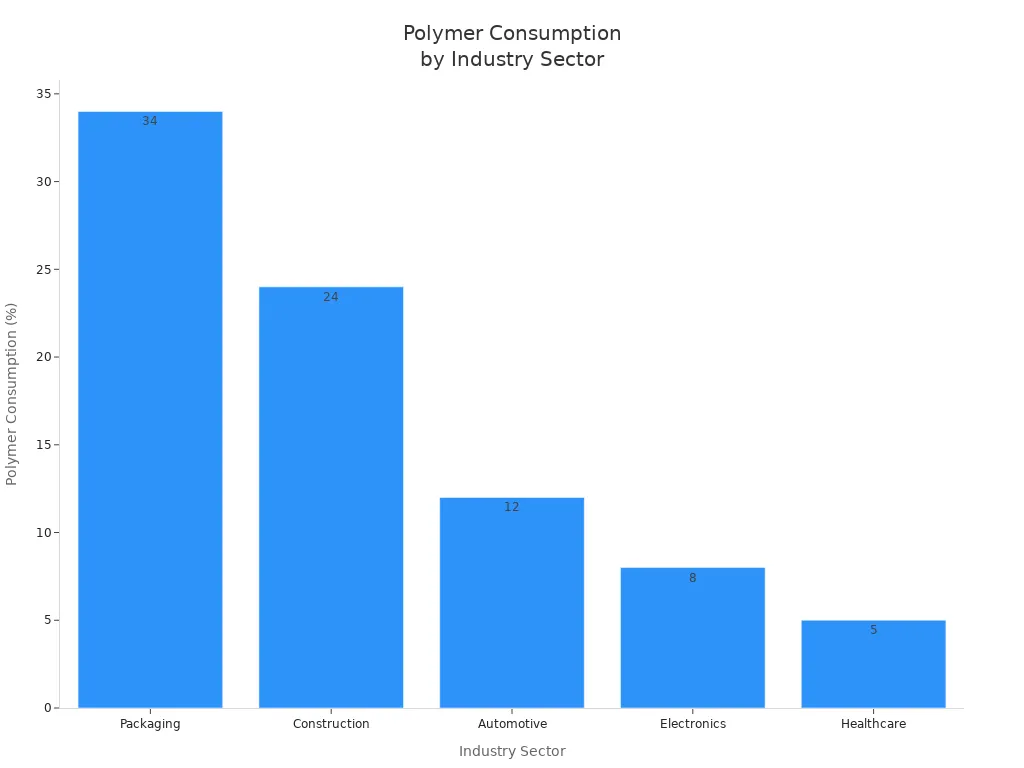
Industry Sector | Approximate Polymer Consumption | Key Applications & Benefits |
|---|---|---|
Packaging | 34% | Extends shelf life, lightweight, barrier properties |
Construction | 24% | Pipes, insulation, windows, doors |
Automotive | 12% | Interior and exterior parts, fuel efficiency |
Electronics | 8% | Device housings, insulation, thermal management |
Healthcare | 5% | Medical devices, packaging, implants |
Fine and specialty chemicals are not the same as bulk chemicals. Fine chemicals are made in small amounts for special uses. Specialty chemicals are special mixes made for certain companies. These chemicals cost more and are used for unique jobs in medicine, farming, food, beauty, and clothing.
Bulk chemicals are made in big amounts for general use.
Ammonia and sulfuric acid are examples of bulk chemicals.
Fine chemicals need hard processes and are made for each customer.
Specialty chemicals are used in small amounts for special jobs.
Fine and specialty chemicals are mixed with others to make final products.
Fine and specialty chemicals help make medicines, pesticides, perfumes, and colors. Chemical industries use these chemicals to bring new ideas and meet special needs.
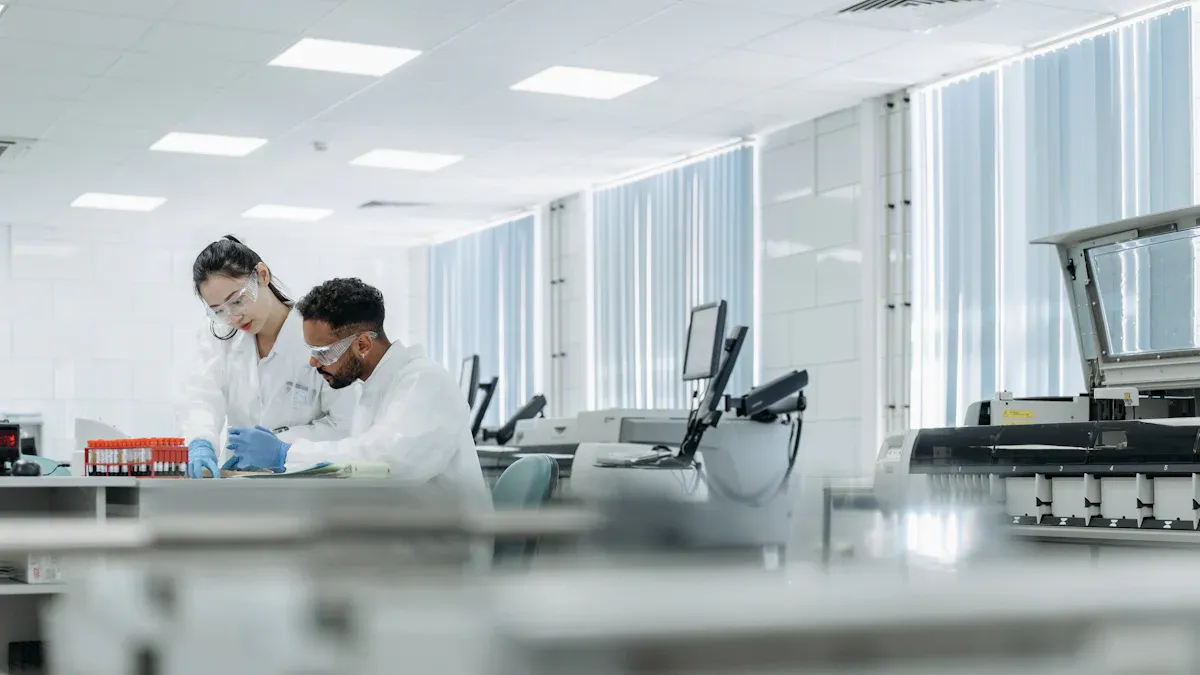
Chemical industries start with raw materials. These come from many places. Oil and gas companies give crude oil and natural gas. Mining companies bring coal, minerals, and metals. Farmers and growers supply things like corn and sugarcane. Utilities provide electricity, steam, and gases for factories. Catalyst suppliers offer special helpers for faster reactions.
Oil, natural gas, coal, and biomass are the main raw materials.
The supply chain has feedstock suppliers, energy providers, and tech companies.
The price and supply of raw materials decide where factories go.
North America uses ethane from shale gas. Europe buys oil. China uses coal. Russia depends on natural gas.
Chemical industries use heat and machines to change these materials. They turn simple things into useful products for homes and businesses.
Factories use steps to turn raw materials into products. First, they plan and design what to make. Workers pick the best raw materials. Machines mix, heat, and cool the materials. Chemical reactions change them into new things.
Key steps are:
Planning and design
Choosing and buying raw materials
Processing and changing materials
Putting parts together and finishing
Checking quality and testing
Packing and sending products
Factories use robots and computers to work faster and safer. Computers watch each step. Sensors check heat and pressure. Digital tools help fix problems quickly. Lean manufacturing cuts waste and makes better products. Supply chain management helps materials arrive on time.
Automation and smart tools help chemical industries make more with less waste.
Quality control checks every product. Workers test samples to make sure they are safe and good. Traceability systems follow each batch from start to finish.
Safety is very important in chemical industries. Workers follow strict rules to stay safe and protect nature. Governments make laws for making, storing, and moving chemicals. Companies must tell what chemicals they use and how much they make.
Regulation Name | Region/Country | Main Focus | Example Requirement |
|---|---|---|---|
TSCA | USA | Chemical safety, reporting | Pre-manufacture notices, data reporting |
REACH | EU | Risk assessment, labeling | Dossier submission, tonnage thresholds |
CEPA | Canada | Environmental protection | Chemical evaluation, reporting |
AICIS | Australia | Chemical import/export | Safety data sheets, labeling |
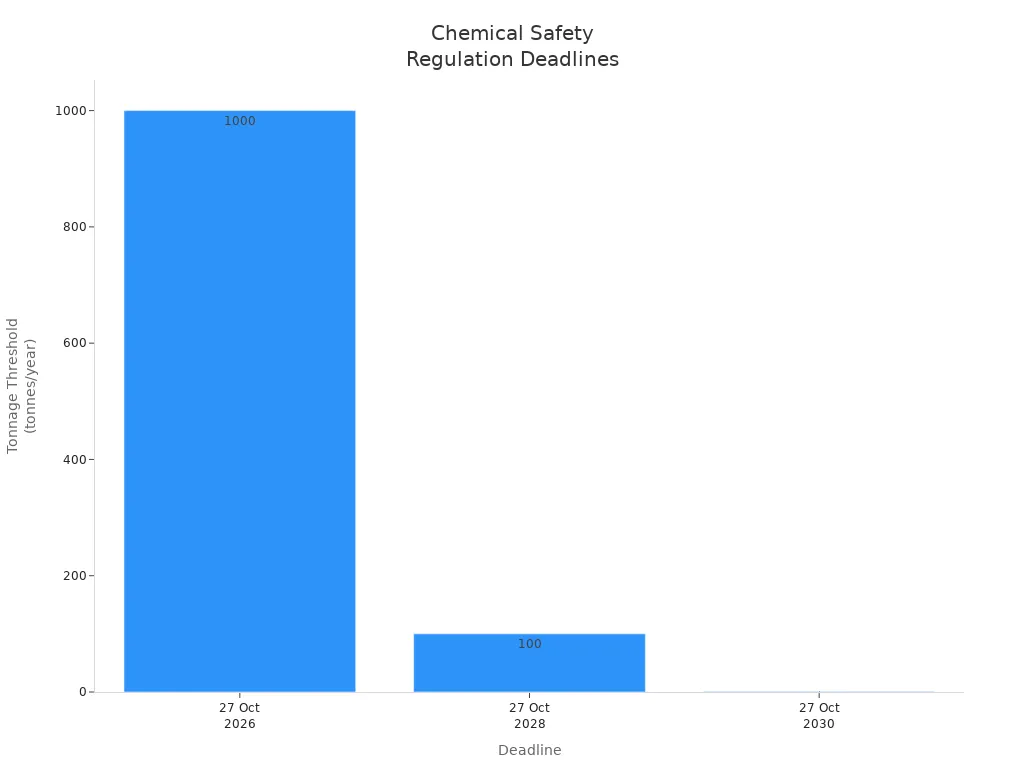
A safety culture means everyone helps stop accidents. Companies teach workers to spot dangers and get ready for emergencies. They use the RAMP model: Recognize, Assess, Minimize, and Prepare. Regular checks and safety officers help follow new rules. Chemical safety information is shared worldwide to keep people and nature safe.
Chemical industries use world standards to keep workers and communities safe.
Research and development (R&D) bring new ideas to chemical industries. Scientists and engineers test new formulas and materials. They use computers, AI, and robots to work faster. Digital tools let labs share data right away.
R&D helps companies make better products quickly.
Automation and AI help reduce mistakes and improve accuracy.
Chemists, data scientists, and customers work together for new solutions.
High-performance computers test chemical reactions fast.
Suzhou Ke Sheng Tong New Materials Technology Co., Ltd. shows how R&D brings success. Their team of over 10 experts makes advanced anti-hydrolysis agents and polyurethane chain extenders. The company has more than 50 patents. Their products help polymers get stronger and last longer. These new ideas support sustainability and meet new market needs.
R&D helps chemical industries stay strong and meet new demands.
New technology like green chemistry, nanotechnology, and smart factories make work cleaner and better. Companies use renewable resources and recycle waste to help the environment.
Chemical industries help us by making things for food, health, energy, and technology. They give people jobs and help many businesses grow. Companies now try to use less energy and protect nature more. Suzhou Ke Sheng Tong New Materials Technology Co., Ltd. is a leader in making biodegradable polymers and hydrolysis stabilizers. These products help things last longer and are better for the planet.
New ideas and working together help chemical industries solve problems and make cleaner products for the future.
The industry is important for clean energy, making things, and daily products.
Safe actions and smart ideas help chemical industries stay strong and useful.
Chemical industries make plastics, medicines, and fertilizers. They also make cleaning products and specialty chemicals. These things help people every day. They help with health, farming, and technology. Companies also make new materials for solar panels. They make biodegradable plastics and things for 3D printing.
Chemical industries give many useful products to different areas.
Companies follow strong safety rules. Workers wear special gear and use safety tools. Governments make laws for handling and moving chemicals. Training and emergency plans help stop accidents.
Safety officers look for dangers.
Companies teach workers about safety.
Innovation helps companies make better products. New technology makes materials stronger and safer. It also helps make things better for the planet. Research teams try new ideas to fix problems and meet needs.
Benefit | Example |
|---|---|
Lasts longer | |
Safer | Green chemistry solutions |
Better for Earth | Biodegradable plastics |
An anti-hydrolysis agent keeps polymers from breaking when wet. Suzhou Ke Sheng Tong New Materials Technology Co., Ltd. makes these agents. They help solar films, biodegradable plastics, and 3D printing materials last longer.
Anti-hydrolysis agents help products stay strong and work well.